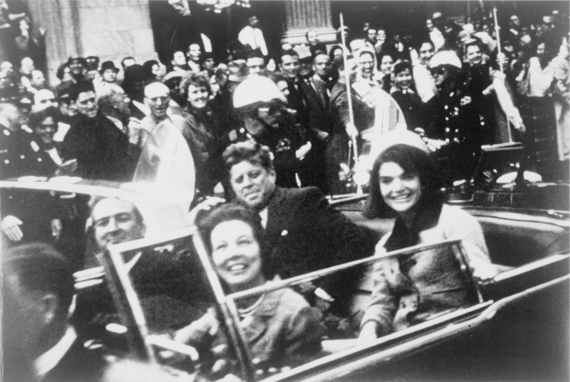The "what ifs" surrounding President John F. Kennedy's death have fascinated historians and history buffs like me for half a century. Yet they almost always presume reelection.
Jeff Greenfield's new novel, "If Kennedy Lived: The First and Second Terms of President John F. Kennedy: An Alternate History" imagines a world in which Kennedy survives assassination and wins a second term in 1964.
But what if Kennedy was never killed 50 years ago in Dallas and lost reelection to Senator Barry Goldwater?
A Kennedy reelection campaign would have been very different from the campaign that Lyndon Johnson actually waged against Goldwater. Kennedy and Goldwater, friends from their Senate days, reportedly talked about flying around the country together in 1964, debating the issues on a kind of "whistle stop" tour for the New Frontier era.
Just as he did with Richard Nixon in 1960, Kennedy may have bested Goldwater in debates. However, what if the Arizona senator was able to exceed expectations and even the scoreboard against the young commander in chief? He may have brought up Kennedy's actions during the 1961 Bay of Pigs fiasco as a supreme example of reckless incompetence.
It is plausible that with Kennedy left to defend his Bay of Pigs and without any real domestic achievement to tout - like Civil Rights, which may not have passed with a living John F. Kennedy in 1964 - a few states (especially in the south) could have shifted into the Republican column. As narrowly as he won election in 1960, Kennedy could have lost the 1964 contest.
What would Jack Kennedy, the one-term former president, do next? At 47 years old, the youngest man ever elected to the office would have also been the youngest former president in American history. (That honor still belongs to Theodore Roosevelt, who left the White House at the age of 50.)
Greenfield's book ends in 1968, but there are decades more to ponder. Kennedy's romantic dalliances, now universally known, would have eventually come to light. Knowledge of his health problems - like Addison's disease and a very bad back - which he fought so hard to keep secret, would have surely leaked. Those revelations may not have hindered his public image in life (they haven't in death), but we will never know for sure.
Nevertheless, after 14 years in Congress and four in the White House, what could Kennedy have done if he became the first incumbent to lose since Herbert Hoover in 1932? He was not a lawyer, like so many of our recent presidents. Thanks to his father's money, he did not need to make millions on the lecture circuit. He would have been too young to retire to the golf courses in Palm Beach.
As President Kennedy himself said in a speech shortly after taking office in 1961:
"It has recently been suggested that whether I serve one or two terms in the Presidency, I will find myself at the end of that period at what might be called the awkward age - too old to begin a new career and too young to write my memoirs."
Kennedy once reportedly told Paul Fay, a close friend and his undersecretary of the Navy, that he would consider running for his old senate seat again after leaving the White House. The President, according to Fay's memory years later, imagined becoming a very respected and influential Member of Congress as a former president, just as John Quincy Adams did (Adams, the only former president elected to the House of Representatives, served eight terms before he died on the job - in the Capitol Building). Kennedy also told his friend that when Robert Kennedy became president "why then I think I could best serve him as Secretary of State."
Another stint in the Senate - or as RFK's Secretary of State - would have been great second acts for him. But politics was never John F. Kennedy's chosen profession. He ran for Congress in 1946 because his brother Joe had been killed during World War II. At heart, he was a writer who tried to make his father proud by taking up the mantle as the next in line.
In 1938, Kennedy published his college thesis, "Why England Slept", about Chamberlain's appeasement of Hitler. In 1945, while working for Hearst Newspapers, he covered the Potsdam Conference. During recuperation from back surgery in 1957, the young Massachusetts senator penned the best-selling book, "Profiles in Courage". After the White House, he may have gone back to journalism, perhaps as a publisher.
Imagine Former President Kennedy - the first celebrity president - launching a media venture. He may have started a magazine which combined politics and celebrity. The 35th president may have even named it after the first president.
Former President John F. Kennedy, the publisher of George magazine.
Imagine.
